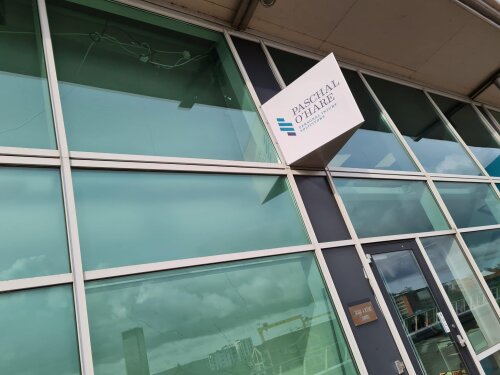Best ADR Mediation & Arbitration Lawyers in Belfast
Share your needs with us, get contacted by law firms.
Free. Takes 2 min.
List of the best lawyers in Belfast, United Kingdom
About ADR Mediation & Arbitration Law in Belfast, United Kingdom
Alternative dispute resolution - ADR - covers a range of ways to resolve civil and commercial disputes outside the formal court process. The two most common ADR methods are mediation and arbitration. Mediation is a voluntary, confidential negotiation process guided by an impartial mediator. Arbitration is a private process in which a neutral arbitrator or panel makes a decision that is usually binding on the parties.
In Belfast, Northern Ireland, ADR operates alongside the local court system. Many businesses, organisations and individuals choose mediation or arbitration to save time, lower costs and preserve relationships. While the substantive rules and practice follow UK-wide statutes and professional standards, specific court procedures, enforcement and funding arrangements reflect Northern Ireland law and institutions.
Why You May Need a Lawyer
You may need a lawyer when considering ADR to protect your legal rights, clarify your position, and make sure any outcome is properly recorded and enforceable. Lawyers add value at all stages: advising whether ADR is appropriate, drafting or reviewing ADR agreements and arbitration clauses, preparing case papers, representing you during arbitration hearings, and converting mediated settlements into legally binding settlement agreements or court orders.
Common scenarios where legal help is important include commercial contract disputes, construction and engineering claims, employment disputes with complex legal issues, family disputes involving child arrangements or finances, cross-border disputes with jurisdictional questions, and situations where one party is unwilling to cooperate. Lawyers also help assess costs, risks and enforceability of any award or agreement.
Local Laws Overview
Key legal features that affect mediation and arbitration in Belfast include statutory frameworks, court rules, and local institutions. The Arbitration Act 1996 is the primary UK statute governing arbitration procedure, the validity of arbitration agreements, and enforcement of awards. Arbitration awards in Northern Ireland are generally enforceable in the courts and are subject to limited grounds of challenge, such as procedural irregularity or jurisdictional error.
Mediation is generally governed by principles rather than a single statute. Confidentiality is a central principle of mediation practice in Northern Ireland, meaning communications made for the purpose of mediation are usually not admissible in court, except in limited circumstances like fraud, threat or where disclosure is necessary to enforce an agreement. Parties should agree in writing the scope of confidentiality and any exceptions.
Local court practice and pre-action procedures in Northern Ireland influence ADR uptake. Courts may encourage or require parties to consider ADR before litigation, and some disputes are subject to local pre-action protocols. Professional regulation and oversight are provided by bodies such as the Law Society of Northern Ireland and the Bar of Northern Ireland. For arbitrators and mediators, recognized accreditation from organisations such as the Chartered Institute of Arbitrators or other ADR bodies is relevant to credentials and discipline.
Frequently Asked Questions
What is the main difference between mediation and arbitration?
Mediation is a facilitated negotiation where a neutral mediator helps parties find a mutually acceptable solution. It is non-binding unless the parties reach and sign a settlement agreement. Arbitration is a private adjudicative process where an arbitrator makes a decision that is usually binding and enforceable, similar to a court judgment.
Are mediation outcomes legally binding in Northern Ireland?
Mediation itself is non-binding until the parties sign a settlement agreement. Once parties sign a written agreement, that agreement becomes legally binding and enforceable. Parties should ensure the settlement is clear on terms, implementation and remedies for breach to avoid future disputes.
Can I appeal an arbitration award?
Arbitration awards are final in most cases, and there are limited grounds for appeal or setting aside. Under the Arbitration Act framework, remedies are usually confined to serious procedural irregularity or questions about arbitrator jurisdiction. Courts in Northern Ireland treat arbitral awards with considerable deference, so appealing an award can be difficult and documentary and procedural evidence must be strong.
How confidential is mediation in Belfast?
Mediation is generally confidential, and communications prepared for or during mediation are usually inadmissible in court. However, confidentiality is not absolute. Exceptions can include allegations of fraud, threats, criminal conduct or where disclosure is necessary to enforce a signed settlement. Parties should record confidentiality terms in a mediation agreement to make expectations clear.
Do I need a solicitor or barrister to attend mediation or arbitration?
You are not legally required to have a lawyer, but legal representation is advisable, especially in complex matters. Solicitors and barristers offer legal advice, help frame offers and counter-offers in mediation, prepare witness statements and submissions for arbitration, and ensure any resulting agreements or awards are properly documented and enforceable.
How long does ADR usually take compared with court proceedings?
Timescales vary by case complexity, but ADR - particularly mediation - can be much faster than court proceedings. Mediation may resolve a dispute in a single session or over a few meetings. Arbitration timelines are flexible and usually quicker than litigation, because parties can agree procedures and timetables. However, arbitration can take longer if there are complex issues or wide disclosure.
How much does mediation or arbitration cost?
Costs depend on the nature of the dispute, the experience and fee rates of mediators or arbitrators, and whether lawyers are involved. Mediation tends to be less expensive than arbitration or litigation because it is typically shorter and less formal. Arbitration costs can approach court costs, particularly in larger commercial disputes. Parties should request clear fee estimates and consider cost-sharing arrangements or staged processes to manage expenses.
Can I enforce an arbitration award in Belfast courts?
Yes. Arbitration awards are generally enforceable by the courts in Northern Ireland. The courts provide mechanisms to enforce awards as if they were court judgments, subject to statutory and international enforcement rules. Enforcement steps should be pursued promptly and with legal advice if a losing party refuses to comply.
What should I look for when choosing a mediator or arbitrator?
Check relevant accreditation, substantive experience in your dispute type, and familiarity with Northern Ireland law and practice. Consider the mediator or arbitrator's style, availability and independence. Ask about previous outcomes, professional insurance and whether they follow a recognised code of conduct. For commercial or cross-border disputes, look for experience in international rules and enforcement.
What happens if the other party refuses to take part in ADR?
If the other side refuses ADR, you can still invite them or record your attempts to encourage court directors to note your willingness to resolve matters early. Depending on the case and local pre-action protocols, refusal to consider ADR can sometimes be a factor in costs decisions if the matter proceeds to court. Where appropriate, your lawyer can explore alternative approaches or prepare to continue in litigation or arbitration.
Additional Resources
Law Society of Northern Ireland and the Bar of Northern Ireland provide guidance on legal representation and professional standards for solicitors and barristers practising ADR. The Northern Ireland Courts and Tribunals Service explains court procedures and how courts interact with ADR. The Chartered Institute of Arbitrators and national ADR centres offer accreditation, practitioner directories and training on mediation and arbitration practice.
Citizens Advice Northern Ireland can provide general information for individuals about rights and options for resolving disputes. For funding and legal aid matters, contact the agency responsible for legal assistance in Northern Ireland to see whether you qualify for support. Local university law schools and professional providers also run ADR clinics and training that may be useful for parties seeking information or low-cost assistance.
Next Steps
1. Assess your dispute - identify the legal and practical issues, the desired outcomes and the urgency. Gather relevant documents and timelines.
2. Seek initial legal advice - contact a solicitor or barrister experienced in ADR to discuss whether mediation or arbitration fits your case and to understand costs and risks.
3. Consider ADR clauses - for commercial relationships, include clear mediation or arbitration clauses in contracts to avoid jurisdictional uncertainty later.
4. Choose the right ADR process and practitioner - agree on rules, venue, language, timetable and confidentiality. Verify credentials and seek written terms of appointment.
5. Prepare thoroughly - work with your lawyer to prepare concise evidence, a coherent position, and realistic settlement parameters for mediation or well-framed submissions for arbitration.
6. Finalise and enforce outcomes - if you reach a mediated settlement, convert it into a properly drafted settlement agreement. If you obtain an arbitration award, ensure you understand enforcement steps and timelines.
If you are unsure where to start, contact a qualified ADR practitioner or a solicitor with ADR experience for a preliminary discussion. Early legal input can save time and expense and increase the chance of a successful outcome.
Lawzana helps you find the best lawyers and law firms in Belfast through a curated and pre-screened list of qualified legal professionals. Our platform offers rankings and detailed profiles of attorneys and law firms, allowing you to compare based on practice areas, including ADR Mediation & Arbitration , experience, and client feedback.
Each profile includes a description of the firm's areas of practice, client reviews, team members and partners, year of establishment, spoken languages, office locations, contact information, social media presence, and any published articles or resources. Most firms on our platform speak English and are experienced in both local and international legal matters.
Get a quote from top-rated law firms in Belfast, United Kingdom — quickly, securely, and without unnecessary hassle.
Disclaimer:
The information provided on this page is for general informational purposes only and does not constitute legal advice. While we strive to ensure the accuracy and relevance of the content, legal information may change over time, and interpretations of the law can vary. You should always consult with a qualified legal professional for advice specific to your situation.
We disclaim all liability for actions taken or not taken based on the content of this page. If you believe any information is incorrect or outdated, please contact us, and we will review and update it where appropriate.











